Women executives: Four speak on moving up the corporate ladder

For women, getting ahead in the still male-dominated corporate world often seems like a series of difficult trade-offs. But that need not be.
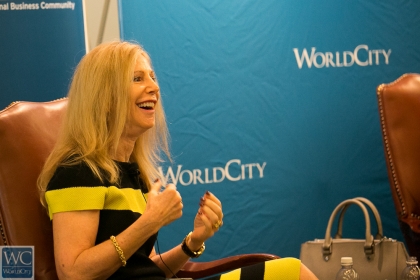
Bonnie Crabtree, senior client partner at Korn/Ferry International
Take it from four who are making their way with humor and vision: Bonnie Crabtree, senior client partner at Korn/Ferry International; Teresa Foxx, director and general manager of Barclays’ Miami office; Grethel Kunkel, vice president for commercial excellence for global emerging markets at Stanley Black & Decker; and Kattia Quintanilla, director of advertising sales and promotions at The Walt Disney Company Latin America’s Disneymedia+.
The quartet were featured speakers at WorldCity’s Global Connections March 26, titled “Women in Charge: A Conversation with Today’s Executive Leaders.”
Though half the population, women today make up just 5 percent of CEOs, and in 2013, held 17 percent of corporate board seats, at U.S. Fortune 500 companies, according to the Pew Research Center.
Family issues: Support vital from spouse, corporate culture
Panelists addressed critical issues head-on, beginning with work-family balance.
“The choice isn’t between family and career,” said Kunkel, who has three young children. “The choice is between guilty and satisfaction. I chose satisfaction.” She carves out quality time at home and recognizes that her work provides her children with greater opportunities.
It helps that men increasingly are involved with family tasks and help wives achieve career success, said executive recruiter Crabtree. “We are seeing more men make a decision to move with their wives.”
Parenting roles are becoming “a joint responsibility – and it has to be, if [both] people are going to pursue a career,” said Foxx.
Corporate culture also needs to be supportive and flexible for women to move up the ranks, Foxx said.

C.L. Conroy, president of The Conroy Martinez Group. Photos by Carlos Miller
Still, maternity leave in the United States pales besides that of other countries, said Oksana Klimovich, director of sales at Windridge Yachts. In her native Russia, maternity leave lasts three years.
Some women in Corporate America worry that taking extended time off may jeopardize the positions they worked years to achieve, said Foxx. “It’s up to the manager to reassure women that, while you are away with your family, your position is protected.”
Promoting women into senior management
Once women reach middle management, momentum to move higher becomes a challenge.
“We talk about it all the time: how do you get more women on boards?,” asked Crabtree. “You can’t just go from middle management to the board…You have to move through the ranks of senior leadership.”
That discussion was sparked by Lynda Pike, senior communications and public relations manager at Medtronic Latin America, who asked panelists how their employers approach promotions for women.
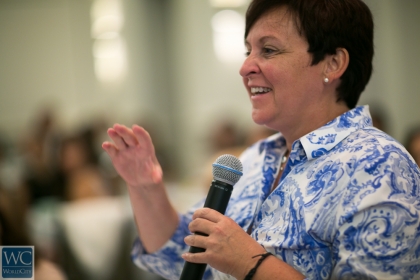
Lynda Pike, senior communications and public relations manager at Medtronic Latin America
“We have a target,” said Foxx about banking veteran Barclay’s. Now, there’s about 40 percent women in middle management and junior executive roles. But women still drop to single digits in senior roles.
“I want to turn to economic opportunity and viability,” said Mel Maguire, executive director, management development dean’s office at Florida International University’s College of Business. How, she asked, are companies helping women move from sales and marketing posts to a wider platform?
“My company encourages higher education and offers programs affiliated with universities,” said Disney’s Quintanilla.
Some companies look to hire “stretch” candidates – someone with potential who may be lacking some qualifications – “to get some diversity,” said Korn/Ferry’s Crabtree.
Strategize better, speak up more
Along the way, women have to strategize better and speak up more to get ahead, panelists said.
Some women turn down advancement, because they don’t want wider exposure and feel comfortable and happy in their current positions, said Kunkel.
“I always tell female executives, ‘If we want to be an expert on the “how,” we will always keep our jobs,” Kunkel said. “If we start thinking more about the “whys,” that’s when we become a leader, that is when we become the boss.’ ”
The gestalt of women’s workforce relations may start early – even in school.
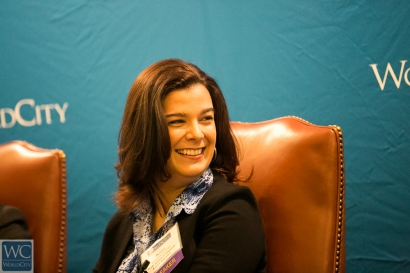
Kattia Quintanilla, director of advertising sales and promotions at The Walt Disney Company Latin America’s Disneymedia+.
Monica Chiarini Tremblay, who chairs the Department of Decision Sciences & Information Systems at FIU’s business college, said women are too willing to take a back seat. “In the classroom if they are speaking and a guy speaks, they stop talking.”
And women often wait until they feel perfect before trying for the next rung on the ladder.
“You don’t have to have A to Z qualifications to qualify for a job, which is what most women wait for…Men, they just have A, and they think they are perfect,” said Chiarini Tremblay, to waves of laughter from the crowd.
Speaking out matters, said Foxx. “Women will sit back and wait to be recognized before applying for a particular position. You need to be able to ask for what you want.”
Growth may be uncomfortable. It’s OK
Not every new role will be completely comfortable – and that’s OK, Foxx said. She recalled how she was the only African-American woman in the training class at the first accounting firm she joined. “It is this kind of story you have to relay,” she told the group.
Still, might women risk coming off as too tough? asked Priscilla Vielma, business development manager at Miami Business Pro. In her previous job, women executives “seemed to be tougher than the guys.”
Women bosses sometimes seem remote because of added pressures to prove themselves, panelists agreed.
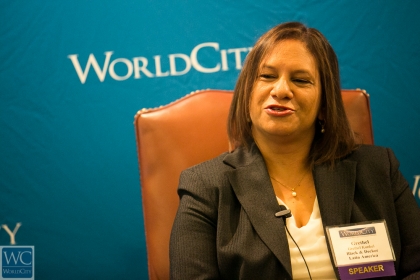
Grethel Kunkel, vice president for commercial excellence for global emerging markets at Stanley Black & Decker
“I’ve dealt with senior women who seem unapproachable. It doesn’t have to be that way,” Foxx said. She suggested networking and socializing outside work as an antidote.
The aggressive versus assertive question inevitably came up.
“If you are called aggressive, be happy and keep doing it,” said Kunkel.
Indeed, women might consider additional behaviors that seem to come easily to men. For example, men often take a job and already consider the next one. “Men will come and say, ‘Let’s talk about my next position,’ ” Kunkel said.
New roles can be lateral too, to help women learn more about the company and gain experience to move up later.
“You need to obtain experiences away from what your are comfortable with,” said Quintanilla. “To grow in a company and reach the senior management divisions we are all aspiring to, you have to have that background as well.”
A future-oriented mindset is key, said Foxx.
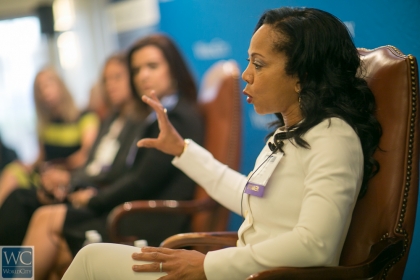
Teresa Foxx, director and general manager of Barclays’ Miami office.
“To maintain your happiness and success, you always have to be thinking about the next thing. Because you can’t just rest on your laurels,” said Foxx. “If you are talented, you have to move forward.”
Global Connections is one of five event series organized by WorldCity to bring together multinational executives in greater Miami. The Global series is sponsored by air conditioning producer Daikin, FIU College of Business and Edelman public relations firm.
The next Global Connections is set for April 24 featuring “Billion Dollar Bosses.